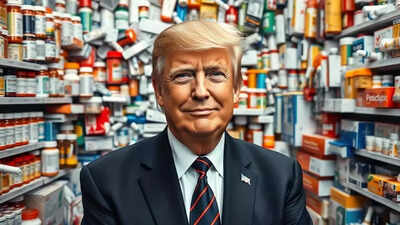Donald Trump tariff relief for now: India’s pharma sector navigates an uncertain US trade future

By Hitesh Sharma
The ongoing trade dynamics between India and the United States may have implications for the pharmaceutical sector, particularly in light of recent tariff announcements. As the US government implements reciprocal tariffs on imports from over 180 countries, the Indian pharmaceutical industry finds itself in a unique position, having received exemptions in the initial tariff announcements.
The exemption granted to the pharmaceutical sector from these tariffs is a welcome relief for Indian companies. While formulations appear to be broadly covered under this exemption, the status of Active Pharmaceutical Ingredients (APIs) and bulk drugs requires careful examination on a case-by-case basis. The exemptions seem to provide some relief to the pharmaceutical sector from significant risks, allowing it to continue supplying nearly half of the US’s generic drug needs, which are vital for affordable healthcare.
However, President Donald Trumphas indicated that there may be potential imposition of reciprocal tariffs on pharmaceuticals as well. The 90-day pause on these tariffs offers some temporary relief, but the U.S. has also initiated investigations into restrictions on imports of pharmaceuticals and pharmaceutical ingredients that may threaten national security. If the U.S. determines that these imports impair national security, the President has the authority to impose tariffs, quotas, or entirely exclude the goods from entering the country.Previous investigations under President Trump have resulted in tariff rates being applied to affected goods, adding a layer of complexity to the situation. Separately, it is possible that India considers removing tariffs on medical devices in exchange for the U.S. dropping tariffs on generics, which could enhance trade relations.
Since India is a supplier of more generics medicine, companies may not have much room to absorb the costs. One can only hope that the US Government looks at requirements of the medicines for their healthcare industry and potential increase in overall costs while looking at the tariffs. Increased costs for Indian pharmaceutical exports to the US could lead to short-term supply chain disruptions. Gradual tariffs might allow for some adjustments, but they could also result in a long-term increased manufacturing costs.These uncertainties necessitate that Indian pharmaceutical companies remain agile and proactive in their strategies.
To mitigate the impact of potential tariffs, market diversification strategies are essential. Indian pharmaceutical firms can explore opportunities in regions such as Europe, Africa, and Latin America, focusing on high-margin products while optimizing their supply chains. However, passing increased costs onto consumers in the generics market may be with some risk due to the inherent price sensitivity of the generic medicine segment.
Within the pharmaceutical landscape, different segments are positioned to absorb cost increases differently. Biosimilars and specialty generics, with their higher margins, maybe better equipped to endure price pressures – however, they also carry higher overall risks and the price elasticity may be different for this segment. Contract Development and Manufacturing Organizations (CDMOs) would also have to monitor the situation as cost pressures may put also pressure on their demand and margins if their customers find it difficult to absorb the rising costs.
As the landscape continues to evolve, companies will need to carefully consider their supply chain structures. Setting up new plants or facilities may not be a straightforward process (for regulated market like USA, a new plant would take between 12 to 24 months to get regulatory clearances), and the uncertainty surrounding tariffs and investigation means that it will likely be a wait-and-watch situation for an extended period.
In conclusion, while the current exemptions and 90-day pause provide a temporary sigh of relief for the Indian pharmaceutical sector, the long-term outlook remains uncertain. The potential for FTAs to facilitate smoother trade relations and provide a framework for mutual benefit is promising. However, companies must remain vigilant and adaptable, as the global trade environment continues to shift.
(Hitesh Sharma is Partner and Lifesciences Leader – Tax, EY India)





